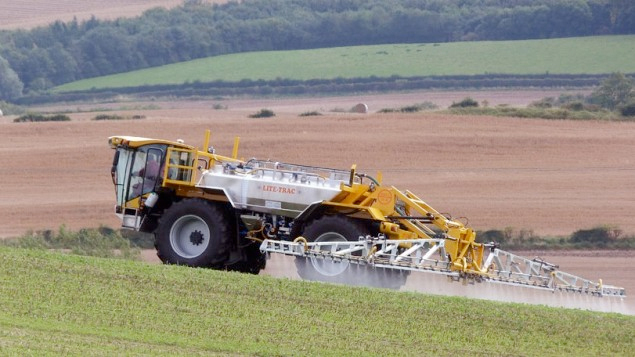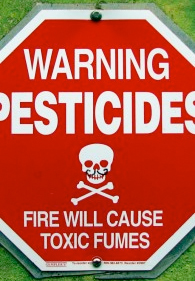Without agricultural chemicals, there would be a lot less food in the world, but with them, water and soil are slowly getting poisoned. A start-up says it has the solution

A Lite-Trac four-wheeled self-propelled crop sprayer spraying pesticide on a field. photo credit: Lite-Trac/Wikipedia Commons
The Green Revolution may have saved a billion people from starvation, according to common wisdom, but the expansion of agricultural technology came at a price: A sharp increase in the use of pesticides and chemicals. These technologies have made it possible for farmers to grow the food needed for an ever-growing population, but they have wreaked havoc on the environment, with chemicals seeping into the groundwater and entering the food chain — setting off who-knows-what consequences in the long-term.
But with technology developed at the Weizmann Institute, and commercialized by Israeli start-up Catalyst AgTech, we may be able to avoid finding out what those long-term consequences are. In what industry professionals have told him is a “game-changing technology,” Shalom Nachshon, CEO of Catalyst AgTech, is hopeful that the work his company is doing will rid the environment of chemicals and pesticides that otherwise could “hang around” in water and soil for hundreds, or even thousands, of years.
“Farmers need to grow 5% to 6% more food a year in order to feed the world’s growing population,” Nachshon told the Times of Israel. “There is no way this could be done without pesticides produced by companies like Monsanto, Dow, Machteshim-Agan, and others. And thus the use of pesticides grows every year.
“But the problem with pesticides and other agricultural chemicals is that many of them are made of synthesized molecules, designed to withstand the elements,” said Nachshon. “Some molecules associated with these chemicals can last for 1,000 years or more, and because they are not natural, they do not break down in the environment.”
Some chemicals just sort of “sit there,” but many are actually harmful, to plants, animals, and humans. Some of the more damaging chemicals have been banned or limited, said Nachshon, “but there are some that are absolutely necessary for growing food.”

Pesticide warning. photo credit: Colin Grey/Wikipedia commons)
Are starvation or a slow death by poisoning the only two options for humanity? Not if Catalyst AgTech has anything to say about it. As Nachshon explains, “Based on technology developed at the Weizmann Institute, we are developing catalysts that will increase the speed of a molecule’s destruction. Instead of hanging around in soil and groundwater, chemical molecules get broken down and rendered inert within days,” Nachshon said.
The secret is in the catalyst that — when added to chemicals and pesticides — it accelerates a chemical reaction with molecules when they settle into the ground, destroying them. B12, for example, is a catalyst that Nachshon and his scientific team have been experimenting with. “B12 is everywhere, so introducing it into a chemical product is no problem. We add the B12 to a specific pesticide, and when it hits a certain set of conditions in the ground, the catalyst accelerates the breakdown of the molecules,” said Nachshon. “It’s important to note that this is not a time-release system, but can happen only when the chemical ‘sinks’ to a certain point in the soil subsurface.
“That ensures that the chemical does what it is supposed to do before being destroyed, said Nachshon. “It’s a simple and eco-friendly method of dealing with chemicals, allowing farmers to do what they need to do in order grow as much food as possible.”
It has the potential to be a great product — but there’s a problem. “Each chemical requires a specific catalyst to break it down in the environment,” said Nachshon. “Each chemical has different characteristics, and responds to a different set of circumstances with a different catalyst. Matching up the catalyst and chemical is a long, difficult process, said Nachshon — but he and his Catalyst AgTech staff are up to the task.
The technology was developed at the Weizmann Institute by Professors Brian Berkowitz and Ishai Dror Ph.D, and is patented. Catalyst AgTech is licensing the technology and has the rights to commercialize and sell it. While the company is still at a very early stage — Catalyst AgTech was formally organized only four months ago — Nachson has been working with the technology since 2011, and believes that it will quickly get the attention of investors. He will be accompanying the The Trendlines Group on a five-city roadshow in the US at the end of April, speaking to investors in New York, Detroit. St. Louis, Denver, and Memphis. He hopes to meet with officials from large agritech companies, like Monsanto.
And if the early returns are any indication, Nachshon has a hit. “I’ve spoken to a number of people in the industry, and they like what they see,” he said. “One acquaintance of mine, who heads a medium-sized agrichemical company, calls this a game changer. We are going to begin our first field test before the summer in the Negev, and if it goes well, as we believe it will, I think we will be quite successful.”
Click here for article.
